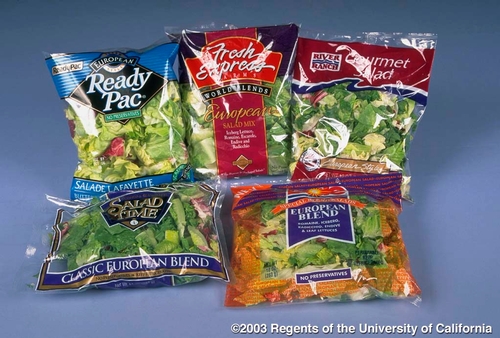Posts Tagged: Trevor Suslow
Enjoy summer’s fruits and vegetables — safely
Now that we’re in the thick of summer and eating bountiful quantities of uncooked fresh fruits and vegetables (salads, and fruit bowls, and tomatoes — oh my!), it’s time to make sure we handle them properly to avoid foodborne illnesses.
According to Dr. Trevlor Suslow, a plant pathologist and Cooperative Extension specialist at UC Davis, “Americans consume more than six billion servings of uncooked fresh fruits and vegetables every year, versus a very small number of illnesses that are clearly linked to foodborne pathogens.”
The take-home message is that the food supply in the U.S. is generally very safe, particularly when everyone in the food supply chain (including consumers) does their part to assure food safety.
The U.S. Food and Drug Administration (FDA) recently released the following information for home consumers:
Nearly 48 million people (1 in 6 people) are sickened by food contaminated with harmful germs each year, and some of the causes might surprise you.
Although most people know animal products must be handled carefully to prevent illness, many don’t realize that produce can also be the culprit in foodborne illness. In recent years, the U.S. has had several outbreaks of illness caused by contaminated fruits and vegetables — including spinach, tomatoes, and lettuce.
Fresh produce can become contaminated in many ways. During the growing phase, fruits and veggies may be contaminated by animals, harmful substances in the soil or water, and poor worker hygiene. After produce is harvested, it passes through many hands, increasing the contamination risk. Contamination can even occur after the produce has been purchased, during food preparation, or through inadequate storage.
The FDA says to choose produce that isn’t bruised or damaged, and make sure that pre-cut items — such as bags of lettuce or watermelon slices — are either refrigerated or on ice both in the store and at home. In addition, follow these recommendations:
- Wash your hands for 20 seconds with water and soap before and after preparing fresh produce.
- Cut away any damaged or bruised areas before preparing or eating.
- Gently rub produce while holding under plain running water. There’s no need to use soap or a produce wash.
- Wash produce BEFORE you peel it, so dirt and bacteria aren’t transferred from the knife onto the fruit or vegetable.
- Use a clean vegetable brush to scrub firm produce, such as melons and cucumbers.
- Dry produce with a clean cloth or paper towel to further reduce bacteria that may be present.
- Throw away the outermost leaves of a head of lettuce or cabbage.
Store perishable produce in the refrigerator at 40 degrees or below.
(Condensed from an FDA news release. The site has an interesting video and useful links to other sites with food safety information.)
For more on what UC Davis and UC Cooperative Extension are doing to assure the safety of fresh produce:
- UC Food Safety website
- Postharvest Technology Center website
- Center for Produce Safety website
- UC publications
E. coli outbreak on lettuce parallels recent
UC research development
Although the outbreak earlier this month of E. coli O145 in shredded Romaine lettuce hasn’t touched California consumers and local retailers, it is impacting the industry. Once again, the safety of pre-washed and cut leafy vegetables are in headlines, raising the fears of consumers and producers alike.
The Centers for Disease Control have confirmed 23 illnesses and 7 probable illnesses in New York, Michigan, Ohio and Tennessee from the contaminated lettuce. The traceback investigation is stretching west to Yuma, Ariz., where the lettuce may have been grown. So far, the source of the contamination has not been identified.
A source of confusion and alarm, however, is the contaminant’s O145 designation. For the past 30 years, the majority of the E. coli illness outbreaks in America were serotype O157:H7. UC Davis Cooperative Extension produce safety specialist Trevor Suslow said E. coli O145 doesn’t come completely out of the blue. O145 is recognized in its association with food in other countries and more often with animal products, not produce.
Suslow and his staff were well aware of E. coli O145 prior to this month’s outbreak and included it in their recent research aimed at development of a new method for detecting a broad range of the most dangerous E. coli bacteria in produce and produce production environments.
The new test was not designed to identify a particular strain of E. coli, but to determine whether a pathogenic/toxigenic strain of E. coli – such as O145 – is present. If the test comes up positive, a secondary test can be conducted to narrow down the specific type of E.coli.
Pathogenic/toxigenic E. coli are of tremendous concern for the fresh produce industry. “Generic” E. coli live in the guts of most mammals; they are typically harmless and may even be beneficial. However, pathogenic/toxigenic E. coli, when ingested by humans, can cause bloody diarrhea and, particularly in the very young and very old, may lead to kidney failure and even death.
Suslow said the new test, which goes by the working name “total pathogenic E. coli,” or TPEC, was tested in a variety of different types of samples: irrigation water, feed lot surface material, manure, compost, soil and produce.
“With all those materials, we had very good effectiveness, but especially with water and produce,” Suslow said.
The research will be presented at the UC Davis Center for Produce Safety Produce Research Symposium on June 23. The Produce Research Symposium is open to the public. A $150 registration fee includes all symposium sessions, breakfast, lunch and an evening reception in the courtyard and gardens of the Robert Mondavi Institute for Wine and Food Science.
For more information or to register for the symposium, see the Center for Produce Safety website at http://cps.ucdavis.edu.

Bagged lettuce was implicated in a recent food safety outbreak.


![Food blog 01 5751417888 59f0a8c3ca m[1] Food blog 01 5751417888 59f0a8c3ca m[1]](http://ucanr.org/blogs/food/blogfiles/7859.jpg)